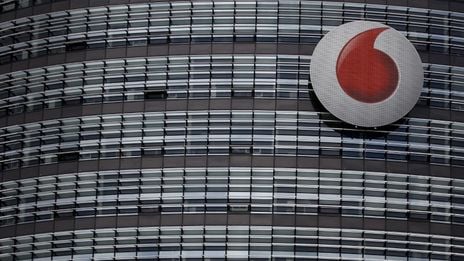By Paul Sandle
Vodafone maintained its dividend on Tuesday, bucking a corporate trend to cut or scrap payouts due to the coronavirus crisis, as the world's second-biggest mobile operator met expectations with a 2.6% rise in full-year core earnings.
The British company said a drop in international travel due to the virus pandemic hit revenues from roaming calls and it expected customer spending to suffer from the economic downturn.
But it said data usage was surging and it was retaining more customers thanks to the speed and reliability of its networks.
Chief Executive Nick Read said the company had delivered a "rapid, comprehensive and coordinated" response to the crisis.
Core earnings reached 14.9 billion euros (13.07 billion pounds)in the year ended March 31, with group revenue up 3% to 45.0 billion euros, driven by business in Europe.
Shares in the group, which have fallen 19% in the last 12 months, were up 8.2% to at 122.22 pence at 1000 GMT.
Read cut Vodafone's dividend a year ago, relieving immediate pressure on its balance sheet.
This time, the group kept its full-year payout at 9.00 euro cents a share. Rival BT Group suspended its dividend.
The Vodafone CEO said free cash flow grew 12.2% to 4.9 billion euros, enabling Vodafone to invest in its network and pay the dividend that many of its shareholders relied upon.
Analysts at Jefferies said Vodafone had highlighted shareholder distributions as a key strategic priority in future, while giving a realistic assessment of COVID-19.
STICKING TO UK PLAN
Read said Vodafone would not change course in Britain after two of its rivals, Liberty Global's Virgin Media and Telefonica's O2, said they would merge in a challenge to BT.
"We remain very focused on our organic strategy," he said. "The market remains structurally favourable for us."
Vodafone was the main rival to BT in enterprise, he said, and it made sense to keep buying wholesale capacity from other providers for its consumer business.
"We are a challenger on the converged consumer side with the capabilities and access to all the infrastructure we need," he said, saying Britain had a different network structure and TV revenue per user to Germany, where it bought Liberty's cable assets last year.
Vodafone, which has 65 million mobile contract and 25 million broadband customers in Europe, said roaming in Europe fell by 65% to 75% in April as the pandemic curbed travel.
The impact could be 500 million euros this year, it said.
Vodafone said some small business customers had requested payment deferrals and some larger enterprise customers had sought to delay projects.
However, the pandemic has boosted demand for data as customers work from home and use technology to stay in contact with friends and family.
Vodafone said mobile data had increased by 15% and fixed-line usage by as much as 70% in some markets.
The rate of customer churn, or switching to rivals, fell 4-5 percentage points as mobile companies closed stores, Vodafone said, adding that the rate of new gross consumer additions reduced by around 40%.
The company said that, given uncertainties surrounding the pandemic, it could not provide adjusted core earnings guidance for the current financial year.
But it said that, based on an assessment of the global economy, it could be flat to slightly down, compared with a rebased 14.5 billion euros for 2019-20.
It did provide guidance for free cash flow before spectrum costs, which underpins its dividend, saying it would be at least 5 billion euros.
(Editing by Kate Holton and Mark Potter)






